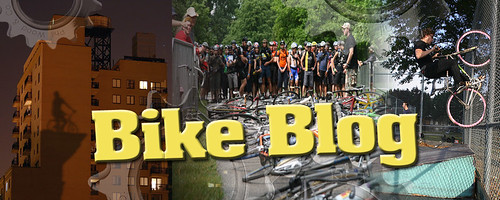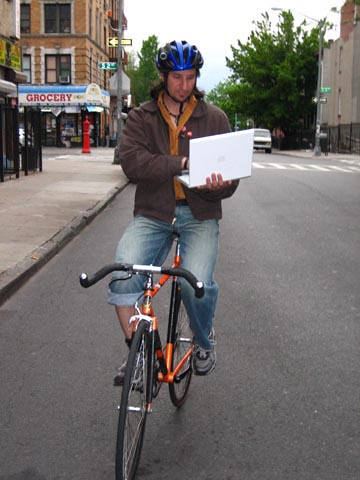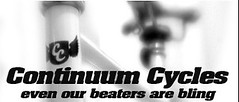Villager Article on new rules
Cyclists say new rules ride roughshod on liberties
By Jefferson Siegel
In a move that caught political activists and cycling groups by surprise, the Police Department last week announced a proposed "clarification" of rules governing a host of events, from public gatherings to political protests to the monthly Critical Mass bike rides.
The proposal, which the public can comment on at an Aug. 23 hearing at Police Headquarters, immediately drew criticism from the legal, political and activist communities.
The proposal would require a permit for groups of 35 or more that gather for walks or demonstrations. In addition, groups of 20 or more cyclists riding together would also be required to get a permit. Any group of two or more that gathers for a protest or march that could disrupt traffic would need a parade permit.
Civil libertarians and politicians were quick to criticize the proposal.
"You need a permit because we have to give you permission to break the law," said civil rights attorney Norman Siegel at a press conference, mocking the mentality of the new permit initiative. Siegel was joined by City Councilmember Alan Gerson and other activists last Thursday at the E. Houston St. headquarters of Time's Up, the 20-year-old East Village environmental advocacy group.
"Very simply, this is a big deal," Siegel warned. The proposal, he said, would hinder First Amendment expressive activity. "These proposals radically change the rules for protest. The result will be less dissent, less protesting, less criticism."
"Small groups of New Yorkers, as small as two people," Siegel noted, "riding their bikes together, would now be required to get a permit." This, Siegel noted, means a family out for a bike ride would be considered lawbreakers and subject to arrest.
Siegel and others believe the proposal is a direct outgrowth of recent rulings in state and federal courts favorable to the monthly Critical Mass bike rides. Those rulings rejected the city's argument that the Critical Mass rides need a permit. Siegel also questioned the Police Department's authority to promulgate such rules. Referring to State Supreme Court Justice Michael Stallman's February ruling, which denied the city's claim that the rides need a permit, Siegel pointed to the word "statutes" in the ruling.
"What the judge was suggesting," Siegel contended, "was that the city of New York change the law. The word 'statue' means the law. It doesn't mean a rule or a regulation."
Councilmember Gerson was no less incensed.
"The right to protest is what characterizes our country as a free society. The right to freely protest goes to the very core of our individual and collective liberty," he said. Gerson agreed that any permit proposal should only result from legislative action and public hearings at the City Council, not at 1 Police Plaza.
"It is wrong...for any agency of the executive branch to attempt to change regulations regarding protests," he said.
Gerson said he would insist the Council fulfill its prerogative to review the proposal.
"Permit requirements for assembly and gatherings should be the exception and not the rule. Let us remember that part of the right to protest is the right to spontaneously protest," he declared.
Several speakers cautioned that gatherings as disparate as class trips, funeral processions and even picnics would be subject to regulation under the proposal.
Noting that permits incur fees, Bill DiPaola, founder of Time's Up, offered another argument against the proposal.
"We don't believe you should have to pay to use public space. Public space should be for the people; the poorest people or the richest people," he said.
DiPaola is one of four defendants being sued by the city for gathering a group of more than 20 for Critical Mass rides without a permit. In 2004, U.S. District Court Judge William Pauley denied the city's request for an injunction against the rides. Last February, Justice Stallman also ruled against the city. An appeal is pending.
DiPaola and cycling advocate Charles Komanoff both said the number of people riding bikes in the city has been increasing, which means safety in numbers. Komanoff considers the city's latest proposal "lethal."
"By discouraging and even criminalizing cycling, the proposed N.Y.P.D. policy will kill cyclists as surely as speeding S.U.V.'s and tow trucks kill cyclists," he said. Komanoff displayed a chart showing that more cyclists on city streets resulted in a lower number being hit by cars.
June, in particular, was a deadly month for cyclists. Three were killed in accidents, including a physician hit by a city tow truck while riding along the Hudson River bike path and a Brooklyn filmmaker who was killed on E. Houston St. after slipping on a street construction plate and falling under a moving truck.
Many at the press conference called for a protest bike ride to the Aug. 23 hearing at 6 p.m. and encouraged a large turnout of speakers.











1 Comments:
If the public can't use public spaces, why pay taxes?
Post a Comment
<< Home